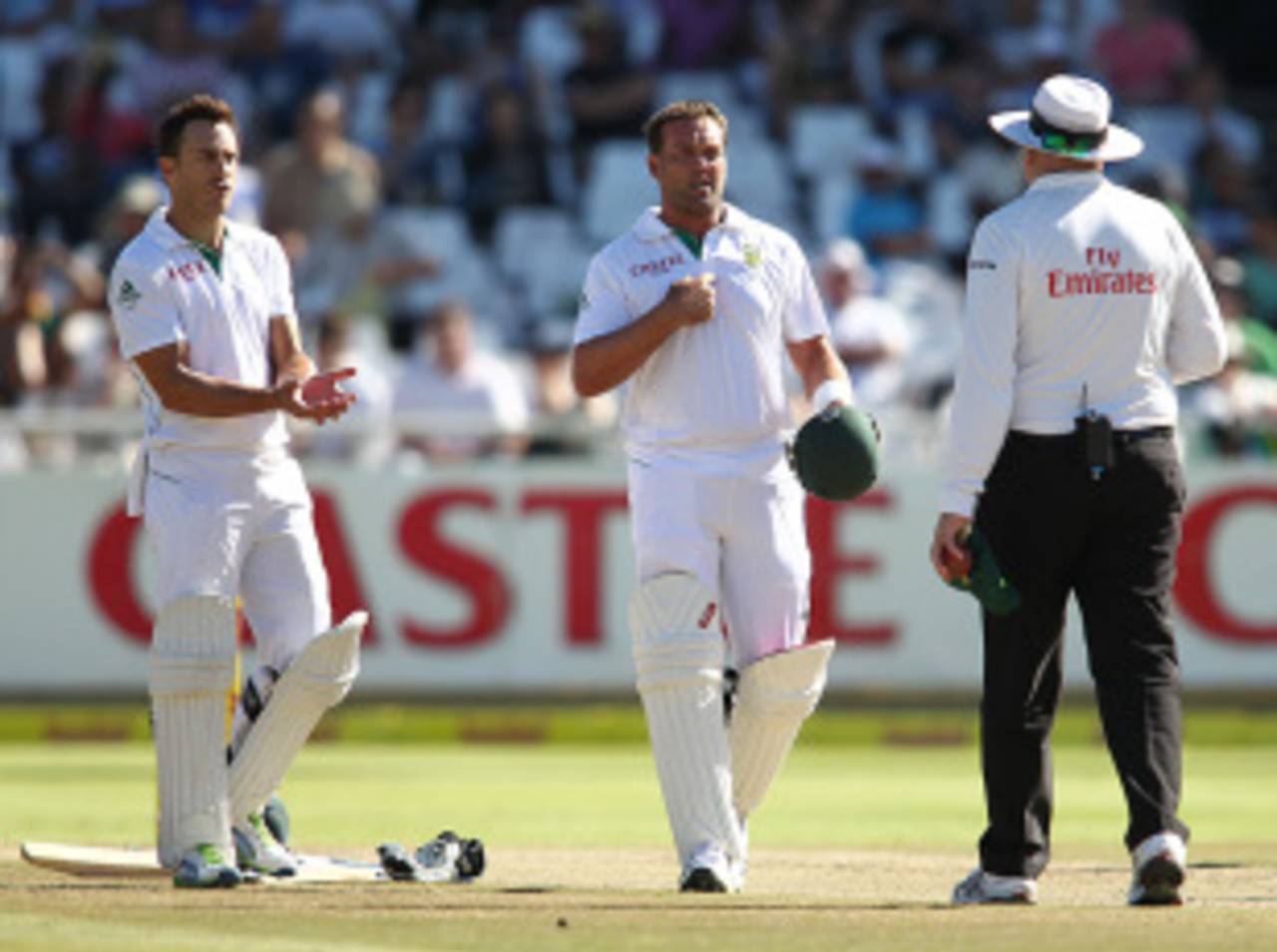ICC admits error in Kallis dismissal
The ICC has admitted its Playing Control Team (PCT) made "an honest error" while applying the DRS to the Jacques Kallis review on the second day of the Newlands Test and that the batsman was erroneously given out
Firdose Moonda at Newlands
15-Feb-2013

Jacques Kallis was given out lbw when he shouldn't have been • Getty Images
The ICC has admitted its Playing Control Team (PCT) made "an honest error" while applying the DRS to the Jacques Kallis review on the second day of the Newlands Test and that the batsman was erroneously given out.
Kallis was given out after an appeal that Pakistan coach Dav Whatmore confirmed was for a bat-pad catch off Saeed Ajmal's bowling. Umpire Steve Davis upheld the appeal but the batsman immediately asked for a review.
Hot Spot replays indicated there was no bat involved, so it couldn't be out caught, but the ball had both pitched and hit Kallis' pad well in line with the stumps and the ball-tracking indicated that it would have clipped leg stump, which was shown to be an umpire's call. As a result, Kallis was instead given out lbw, after input from the third umpire, Billy Bowden.
The playing conditions allow for the method of dismissal to be changed during a review but have specific terms under which that can be done.
Point 3.3 (f) in the playing conditions states: "The third umpire shall not withhold any factual information which may help in the decision making process, even if the information is not directly prompted by the on-field umpire's questions. In particular, in reviewing a dismissal, if the third umpire believes that the batsman may instead be out by any other mode of dismissal, he shall advise the on-field umpire accordingly. The process of consultation described in this paragraph in respect of such other mode of dismissal shall then be conducted as if the batsman has been given not out."
So when it was evident Kallis could not be out caught, because he had not hit the ball, the evidence for an lbw decision should have been considered from the point of view that the on-field umpire had ruled it not out. The projected path of the ball - clipping leg stump - was then an umpire's call, according to the DRS, and Kallis would have been not out.
"The PCT made an honest error in this extremely rare situation," the ICC said in a release. "The umpires followed usual umpiring principles in giving Kallis out lbw on umpire's call the review was for the batsman out caught. This is because the normal principle is that an appeal covers all forms of dismissal.
"However, the playing conditions state that when the third umpire observes that the batsman could be out by another mode of dismissal, the decision being reviewed using DRS should be as if the batsman had been originally given not out. Therefore, in this instance Kallis, as the point of impact was umpire's call, should not have been given out lbw."
South Africa's team management was "happy with the explanation" they were given, though Kallis had appeared confused about the mode of his dismissal at the time and had held a lengthy conversation with Davis before leaving the field. Team manager, Mohammed Moosajee confirmed South Africa had been involved in discussions with the umpires but said they would not take the matter further.
"There is a code of conduct which we need to abide by when it comes to DRS. We sought clarity from the umpire and we were happy with the explanation," Moosajee said. "We understand that if a batsman is given out for something and the technology shows something else, the third umpire is within his rights to make that decision."
Whatmore interpreted the dismissal in the same way. "My understanding is that when a decision is referred to the TV umpire, he can make his own decision," he said.
This is the second time in the series that DRS has come under discussion. At the Wanderers, Pakistan were unhappy with the use of Hotspot after four decisions went against them. They indicated they would write a report to the ICC and Whatmore said any grievances would be addressed through the channels provided, although nothing further was heard about the issue.
Whatmore remained a backer of DRS in spite of the recent incidents. "I have always been a supporter of technology assisting umpires to make the right decisions. We are very pleased to have DRS. We had a series a few months ago in which we didn't have DRS and it was very frustrating."
South Africa were also in favour of technology. Graeme Smith previously went on record advocating that DRS be used across the board. Kallis, however, had an outburst about ball-tracking technology on South Africa's tour of New Zealand last March in which he said "99% of cricketers," do not trust it.
Firdose Moonda is ESPNcricinfo's South Africa correspondent